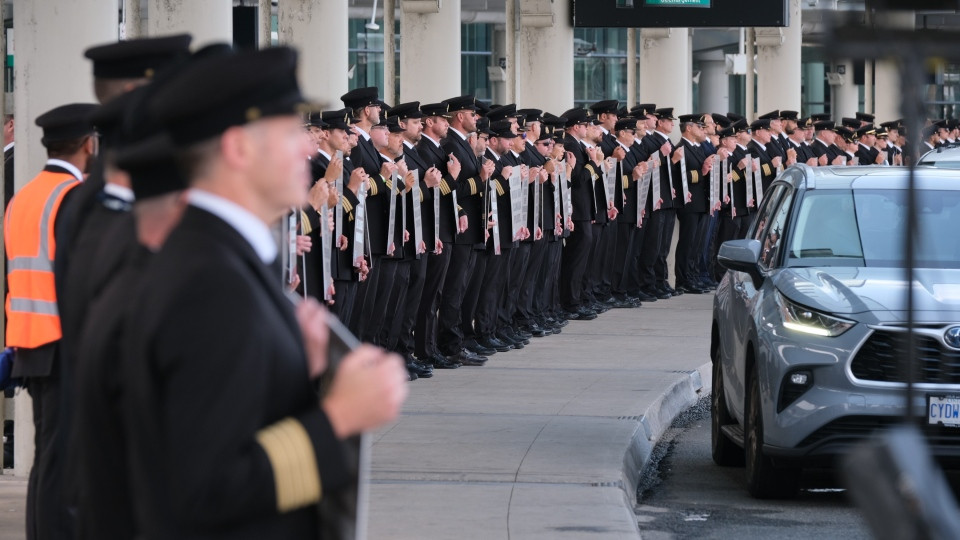Air Canada pilots are on the brink of a strike that could ground 670 flights daily and leave over 110,000 passengers stranded, creating widespread travel chaos. The Air Line Pilots Association has voted to approve a strike mandate, potentially pushing 5,200 pilots to walk off the job as early as this weekend if a last-minute deal cannot be reached. The looming strike highlights the precarious state of the Canadian airline industry and the potential consequences of government policies that have protected domestic airlines from foreign competition.
The impact of a potential strike is already being felt, with travelers scrambling to reschedule vacations and flights. Those with ironclad plans have been scouring online to find alternative bookings for flights, sometimes paying hundreds more for a last-minute ticket. The situation is particularly concerning for those traveling within Canada, as foreign airlines will only be able to pick up some of the slack on overseas flights.
The Impact on Travelers
The potential strike has created significant anxiety for travelers, especially those with non-refundable tickets. Clive and Beverly Dudley, who were planning a 50th wedding anniversary trip to England, had to abruptly scrap their trip after Air Canada announced its preparations for a possible shutdown. Despite losing $700 from cancelling their non-refundable condo rental, they were ineligible for a refund for their flight because it had not been canceled yet. They were instead offered a travel credit to buy tickets at a later date.
Customers who decide to wait for their Air Canada flight to be canceled in the event of a strike will be eligible for a full refund, but won't be compensated for meals, hotels, and other incidental expenses. This is because labour disruptions are considered to be outside of an airline's control under Canada's Airline Passenger Protection Regulations.
The Airline Industry's Response
Air Canada has stated that it is working to arrange flights with other carriers in case of a strike, but seats are expected to be limited. Porter Airlines and Flair Airlines have both indicated that they may be able to add some capacity on certain routes, but their focus will remain on operating their core flight schedules. WestJet, however, has warned that last-minute flight bookings might result in higher fares.
A Look at the Bigger Picture
The potential Air Canada pilots strike is not an isolated incident. It is a symptom of a larger problem within the Canadian airline industry, characterized by a lack of competition and high prices. For decades, Canadian airlines have enjoyed protection from foreign competition, leading to a duopoly dominated by Air Canada and WestJet. While there have been some improvements in recent years, with the federal government increasing the foreign ownership limit to 49 per cent and the emergence of some discount airlines, the two major carriers still control over 70 per cent of the market.
This limited competition has allowed Air Canada and WestJet to drive up prices and stifle innovation. The situation would be vastly different if large carriers from elsewhere in the world were allowed to operate domestic flights. In Europe, for example, the liberalization of the airline industry in the 1990s led to a significant increase in flights and routes, driving down prices and increasing consumer choice. The United States also boasts a more competitive air travel sector, with four carriers controlling around 78 per cent of the market.
The Need for Change
The potential Air Canada pilots strike is a wake-up call for the federal government. It is time for Canada to embrace a more competitive airline industry by allowing international carriers to compete on domestic routes, removing foreign ownership limits, and taking steps to reduce airport fees.
This would not only benefit consumers by driving down prices and increasing choice, but also stimulate economic growth by creating new jobs and encouraging innovation.
The strike is a major disruption, but it also represents an opportunity for Canada to address the long-standing issues plaguing the airline industry.
The Future of Air Travel in Canada
The outcome of the Air Canada pilots strike will have a profound impact on the future of air travel in Canada. If the strike goes ahead, it will be a major inconvenience for travelers, but it will also send a strong message to the government about the need for change.
The government must take decisive action to create a more competitive and consumer-friendly airline industry. This will require a commitment to deregulation, a willingness to open up the market to foreign competition, and a focus on reducing airport fees. By taking these steps, Canada can ensure that its airline industry remains vibrant and that travelers have access to affordable and reliable air travel.

















